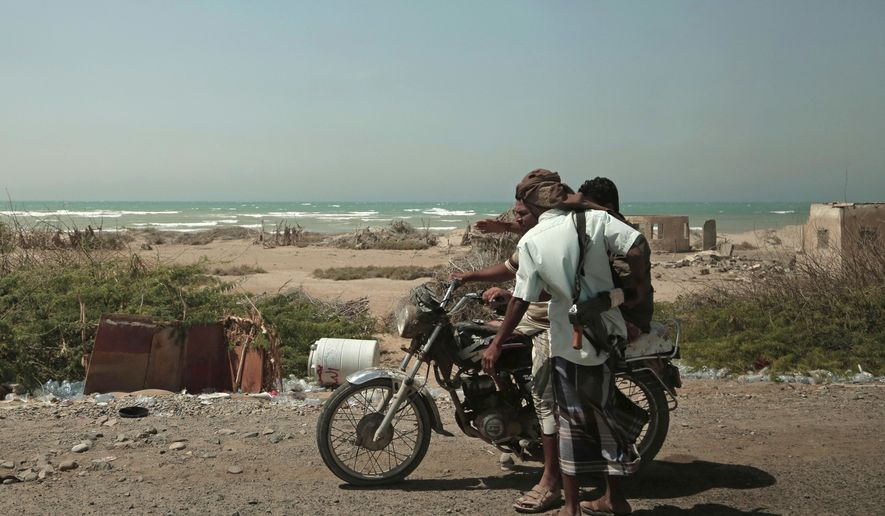The Saudi-led coalition battling Iranian-backed Houthi separatists in Yemen launched a long-awaited, high-risk campaign to break the back of the insurgency, with American military assistance, in a mass offensive against a key rebel stronghold in the country.
But U.S. officials at the Pentagon and State Department are warning Riyadh that fallout from the operation could deepen the suffering in what is already one of the world’s worst humanitarian crises.
Saudi-led ground troops, including forces from Egypt, Jordan, United Arab Emirates and other Sunni-dominant Muslim nations, rolled toward the Yemeni port city of Hodeidah, which lies 140 miles of the capitol Sanaa, has been the main supply line for international humanitarian aid to the war-torn nation. The port is also believed to be the major transfer point for Iranian weapons, material and equipment for the Houthi militia since civil war broke out three years earlier.
Retaking the port city will give the exiled government’s forces and their Saudi allies control of critical Bab al Mandab straits, which controls access into and out of the southern Red Sea. Government troops and their Saudi counterparts also reportedly launched counterterrorism offensives against Houthi strongholds near Sanaa, as part of the overall operation.
The sheer volume of air and ground forces being poured into the Hodeidah operation by the Saudi military coalition marks one of the largest offensives undertaken against the Houthi separatists since 2015.
“The liberation of the port of Hodeidah is a turning point in our struggle to take back Yemen from the militias that hijacked it to carry out foreign agendas. The operation to liberate the port represents the beginning of the fall of the Houthis,” officials from the government of exiled Yemeni President Abdrabbuh Mansur Hadi said in a statement Wednesday.
The Hodeidah operation, if successful, will “eliminate the influence of Iran, which has long flooded Yemen with weapons to shed Yemeni blood,” government officials say.
Bombardment was heavy, with one aid official reporting 30 strikes in 30 minutes.
“Some civilians are entrapped, others forced from their homes,” Jolien Veldwijk, the acting country director of the aid group CARE International, told the Associated Press. “We thought it could not get any worse, but unfortunately we were wrong.”
Houthi rebels, with support from Iran’s Islamic Revolutionary Guards Corps and Hezbollah, ousted Ali Abdullah Saleh during its armed revolt in the country. Since then, the country has become a key proxy battleground in the clash between Riyadh and Tehran for influence across the Middle East.
Washington has publicly sought to distance itself from Saudi Arabia’s operations in Yemen, despite the Trump administration’s efforts to strengthen military and diplomatic ties with Riyadh.
But the Saudis’ heavy-handed strategy to defeat the Houthis, punctuated by an devastating artillery and an aerial campaign that reportedly included cluster bombs, has caused consternation among U.S. officials and generated outrage among human rights groups.
“We are dealing with a humanitarian crisis in Yemen,” Defense Secretary James Mattis told reporters on Monday, days before the Hodeidah offensive. Officials from human rights group Amnesty International called upon Washington and the international community to ensure the Saudi operation would not lead to more civilian bloodshed.
“During the past three years of fighting in Yemen, all parties to the conflict have disregarded their obligations under international humanitarian law, consistently carrying out unlawful attacks that have killed or injured civilians,” according to a statement from the group.
Secretary of State Mike Pompeo said administration officials have conveyed Washington’s concerns over the offensive, and the impact the port’s recapture may have on future humanitarian efforts. “We expect all parties to honor their commitments to … support a political process to resolve this conflict, ensure humanitarian access to the Yemeni people, and map a stable political future for Yemen,” he said in a statement.
While U.S. forces in the region remain in contact with their counterparts in Riyadh and Sana’a, the Pentagon is not actively backing the Saudi offensive in Yemen, Mr. Mattis said Monday. “We are not engaged in the Red Sea” outside of traditional U.S.-led counterterrorism operations against al Qaeda’s Yemeni faction.
But the Pentagon has provided aerial imagery and other intelligence to their Saudi counterparts to assist in the Hodeidah offensive, the Wall Street Journal reported Wednesday. Army Special Forces teams were also reportedly on the ground in Yemen, assisting Arab forces in targeting Houthi redoubts in the south.
• Carlo Muñoz can be reached at cmunoz@washingtontimes.com.




Please read our comment policy before commenting.